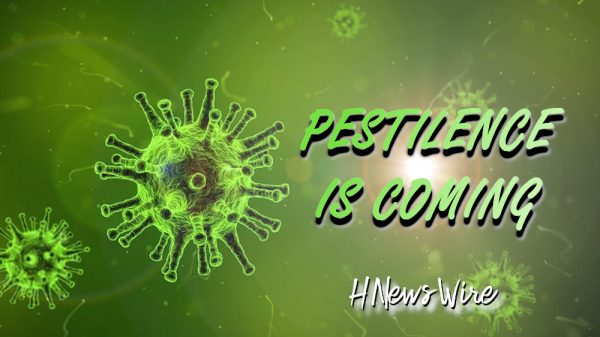Watchman Gives “Warning” Pestilence Has Gained Control: Some of the Most Widely Prescribed Medications in the World Cause Antibiotic Resistance, Giving Them the Potential to Become Deadly Superbugs

The Plandemic Has Now Turn Into a Pestilent Also Known as Death Angel, It Will Reverse Course and Wreak Havoc Upon the Perpetrators, You Know Who You Are China, Fauci, Gates Take Cover…
HNewsWire: God makes an interesting statement as He is reproving His people through the prophet Jeremiah. In Jeremiah 6:15 God says that although His people should have been ashamed of their actions and choices, “They did not even know how to blush.” That is America This is a really good time to be selling underground bunkers.
The time of tribulation upon the earth is HERE. Its severity is without historical precedent. Concerning this time, the angel, Gabriel, told Daniel, that it “will be a time of distress such as never occurred since there was a nation until that time” (Dan 12:1a). This time of tribulation is in keeping with unfulfilled prophecy given to Daniel that pertains to Israel (Dan 9:24-27). It is during this time that God’s wrath will be poured out upon the world—specifically those who are hostile to Him and His people.
![]()
A new study published in PNAS on Jan. 23, 2023, has shown that antidepressants, some of the most widely prescribed medications in the world, cause antibiotic resistance, giving them the potential to become dangerous superbugs.
“Even after a few days exposure, bacteria develop drug resistance, not only against one but multiple antibiotics,” Jianhua Guo, one of the study’s authors and a professor at the University of Queensland’s Australian Centre for Water and Environmental Biotechnology, told Nature. “This is both interesting and scary.”
In the study, researchers exposed Escherichia coli or E.coli bacteria to five common antidepressants: sertraline (Zoloft), duloxetine (Cymbalta), bupropion (Wellbutrin), escitalopram (Lexapro), and agomelatine (Valdoxan), then over a two month exposure period, the team exposed the bacteria to thirteen antibiotics representing six different classes of drugs.
Every one of the antidepressants caused the E.coli to develop antibiotic resistance, but two in particular, sertraline (Zoloft) and duloxetine (Cymbalta), had the most pronounced effects, producing the largest number of resistant bacterial cells.
Guo’s interest in non-antibiotic drugs contributing to antibiotic resistance came in 2014 when his lab discovered that there were more antibiotic-resistant genes in domestic wastewater than in wastewater from hospitals—where they use more antibiotics.
This led to the discovery by his team and others that antidepressants were able to kill or slow the growth of certain bacteria, which Guo says provokes “an SOS response,” triggering defense mechanisms in the bacteria that help them survive and subsequently resist antibiotic treatments.
These findings led Gou and his team to conduct the present study to find out if antidepressants could cause bacteria to become resistant to antibiotics.
In addition to demonstrating that antidepressants cause antibiotic resistance, the study also found that the higher the dose of antidepressants, the faster the E. coli bacteria developed resistance and the more antibiotics they could resist within the two-month study window.
Interestingly, the bacteria in well-oxygenated environments developed resistance more quickly than those in low-oxygen laboratory conditions. This might be good news for humans as a low oxygen environment better represents the human intestine, where E. coli bacteria grows in the body.
The study also revealed that at least one of the antidepressants, sertraline, sold under the brand name Zoloft, encouraged the transmission of genes between bacterial cells, allowing the spread of resistance through a population. These transfers can happen between different types of bacterium, enabling resistance to jump between species, which can include going from harmless bacteria to infectious ones.
The Prolific Use of Antidepressants
Worldwide, antibiotic resistance is a serious public health threat. An estimated 1.2 million people died as a direct result of antibiotic resistance in 2019—and that number is expected to increase in the years ahead.
A comprehensive epidemiological study led by the University of Bristol and published in the British Journal of Psychiatry Open, analyzed data on over 200,000 people. Researchers set out to see if long-term antidepressant use (over five and ten years) was associated with the development of six health problems: diabetes, high blood pressure, coronary heart disease, stroke (and related syndromes) as well as two mortality outcomes—death from cardiovascular disease or from any cause.
Researchers found that long-term antidepressant use was associated with an increased risk of coronary heart disease, and an increased risk of dying from cardiovascular disease and from any cause. The study notes that the risks were greater for those taking non-SSRI (selective serotonin reuptake inhibitors), which include mirtazapine, venlafaxine, duloxetine, and trazodone, and that their use was associated with a two-fold increased risk of coronary heart disease, cardiovascular mortality and all-cause mortality at the 10-year mark.
According to the Pharmaceutical Journal, antidepressant prescriptions in the U.K. have increased by 35 percent in the past six years, and those prescriptions rose by 5.1 percent in 2021/2022—the sixth consecutive annual increase. These numbers highlight not only an alarming rise in antidepressant use, but the implications of the potential antibiotic resistance of these drugs.
Definitive Healthcare, who collect and analyze healthcare data, compiled a list of the top 20 antidepressants by prescription volume in the United States. The top three prescribed antidepressants for 2021 were:
- Zoloft (sertraline hydrochloride)–18,337,255 prescriptions
- Desyrel/Oleptro (trazodone hydrochloride)–15,175,105 prescriptions
- Wellbutrin (bupropion hydrochloride)–14,849,887 prescriptions
The 20 antidepressant medications on the list account for nearly 130.5 million prescriptions in the United States in 2021 alone.
How Dangerous is Antibiotic Resistance?
According to the World Health Organization, antibiotic resistance is one of the biggest threats to global health, food security and development. They cite that a growing list of infections including pneumonia, tuberculosis, blood poisoning, gonorrhea and foodborne diseases are becoming harder and sometimes impossible to treat as antibiotics become less effective.
The WHO warns that “without urgent action, we are heading for a post-antibiotic era, in which common infections and minor injuries can once again kill.”
Some of the deadliest bacterial infections are tuberculosis, anthrax, tetanus, pneumonia, cholera, botulism, and pseudomonas infections. MRSA, or Methicillin-resistant Staphylococcus aureus, is one of the most common infections that have become resistant to antibiotics and the symptoms generally begin as swollen, painful red bumps on the skin that look like pimples or spider bites. Many cases are mild, but some can cause more serious infections that can be life-threatening. Because MRSA is difficult to treat and resistant to antibiotics, it is often referred to as a “superbug.”
The PNAS study states that the United States’ high consumption of antibiotics—16,850 kilograms annually in the United States alone—with the addition of their findings, highlights the need to re-evaluate the antibiotic-like side effects of antidepressants.
Implications for Humans
Considering these effects were only observed in petri dishes, more research is needed to know if antidepressants could fuel the rise of superbugs in human bodies or the environment.
“The Worst Is Yet To Come” Pestilence Is Lethal, Its Not The Flu Bro...

As Pestilence Continues to Sweep the Planet, Humanity Continues to Jab God in the Eye, a Strong Delusion Has Been Placed on the Ungodly...

Revelation 2:23
I will kill her children with Death, and all the assemblies will know that I am he who searches the minds and hearts. I will give to each one of you according to your deeds…
![]()

